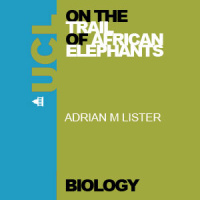Sinopsis
The BBC Natural History Unit produces a wide range of programmes that aim to immerse a listener in the wonder, surprise and importance that nature has to offer.
Episodios
-
Living World from the Archives - Mellow Fruitfulness
15/10/2017 Duración: 21minBrett Westwood relives programmes from 50 years of the Living World archives. In this episode from 1988 Peter France is on the South Downs with ecologist David Streeter.Hips haws and honeysuckle berries enliven the hedgerows. On the ground toadstools appear as if by magic and acorns rain from above - all to ensure future generations of their kind. David Streeter and Peter France sample the fruits of autumn while delving into the many evolutionary mechanisms plants employ to move the next generation across the landscape, with a little help of course.
-
Living World from the Archives - The Late Arrivals
08/10/2017 Duración: 21minBrett Westwood relives programmes from the Living World archives, this week an episode from 2008. More familiar in our gardens and parks, the red admiral butterfly is found throughout the British Isles and is one of the highlights of the butterfly season. It is an unmistakable butterfly with its black wings, and striking red bands. But how do they get here? Well for this Living World, Lionel Kelleway travels to Lulworth Cove in Dorset where, standing on the cliffs and fully expecting to be looking out for autumnal bird migration, instead he witnesses the small bands of Red Admiral butterflies flying in from the sea as they migrate from mainland Europe. With Lionel is Richard Fox from Butterfly Conservation, who explains what's happening.
-
Living World from the Archives - Hamsterley Forest
01/10/2017 Duración: 21minBrett Westwood relives programmes from The Living World archives. In this episode from 1991 Michael Scott travels to Country Durham where in Hamsterley Forest he meets botanist David Bellamy and Ranger Brian Walker on a tour of the area. A combination of careful management and a degree of good luck have turned Hamsterley Forest, Co Durham, into a haven for wildlife. Along with almost 100 different varieties of tree, ferns, and other fascinating plants, the wood pasture and meadows provide ideal habitats for birds like the crossbill, siskin, curlew and nightjar.
-
Living World from the Archives - Waxcap Grasslands
24/09/2017 Duración: 21minBrett Westwood relives programmes from the Living World archives. In this 2011 episode Paul Evans joins Bruce Langridge from the National Botanic Garden of Wales and Dr Gareth Griffiths, a mycologist from Aberystwyth University on a fungal foray with a difference, as they look for jewel like waxcap fungi hidden amongst grass.
-
Bone Stories : Ben Garrod Reveals Five Bone Stories
19/08/2017 Duración: 01h08minFirst broadcast on Radio 4 as a five part series, evolutionary biologist Ben Garrod follows a trail of five clues, beginning with a bone or skeleton and leading to a series of fascinating revelations. Brought together into one single episode, Ben first explores the link between an 18th century skeleton in the Hunterian Museum and Brendan Holland from County Tyrone, before turning his attention to a storm, a Norfolk beach and the unearthed bones of the oldest mammoth found in the UK. Next Ben reveals how studies of the skeletons of the Long Bow Archers who sank with the Mary Rose in 1545 could help medical science, before heading through time to reveal how the skeletal remains of the Dodo may hold the key to life beyond the grave. Finally Ben discovers how the jaws of a man-eating tiger are vital evidence in understanding the role of predation on human evolutionary behaviour.
-
Bone Stories : (Episode 5 of 5) Man-eating Tiger
18/08/2017 Duración: 14minEvolutionary biologist Ben Garrod stares into the jaws of a man-eating tiger and learns how samples from the bones are providing vital evidence in understanding the role of predation on our evolutionary behaviour. Were our early ancestors primarily hunters or hunted?
-
Bone Stories : (Episode 4 of 5) Dodo
17/08/2017 Duración: 13minThe Dodo is byword for extinction, or at least it has been. Evolutionary biologist Ben Garrod discovers how the skeletal remains of this extinct bird may hold the key to life beyond the grave and that extinction could be a thing of the past.
-
Bone Stories : (Episode 3 of 5) the Mary Rose Archer
16/08/2017 Duración: 13minEvolutionary biologist Ben Garrod tries his hand at pulling a medieval long bow and discovers how studies of the skeletons of the archers who sank with the Mary Rose could help patients with dyspraxia.
-
Bone Stories : (Episode 2 of 5) West Runton Mammoth
15/08/2017 Duración: 13minEvolutionary biologist Ben Garrod heads to a Norfolk beach to hear how a raging storm led to the discovery of one of the oldest mammoth skeletons ever to have been found in the UK and the best preserved skeleton of this species in the world. The skeleton revealed a treasure trove of information about life some 600,000 to 700,000 years ago.
-
Bone Stories : (Episode 1 of 5) The Irish Giant
14/08/2017 Duración: 13minEvolutionary Biologist Ben Garrod follows a trail of clues beginning with a bone or skeleton and leading to a fascinating revelation. In this programme, Ben explores the link between an 18th century skeleton in the Hunterian Museum and Brendan Holland from County Tyrone who reached a height of 6’10” and has been diagnosed with gigantism. Ben follows a trail of clues and discovers how recent findings could mean that in the future there are no more Irish giants.
-
Living World from the Archives - Glow Worms
09/07/2017 Duración: 21minBrett Westwood relives programmes from The Living World archives. In this episode from 2013, Chris Sperring is in Buckinghamshire with Robin Scagell on a glow worm safari.
-
Living World from the Archives - The Shell Nesting Bee
02/07/2017 Duración: 21minBrett Westwood relives programmes from The Living World archives. In this episode from 2014, Trai Anfield is in Dorset with naturalist John Walters.
-
Living World from the Archive - The Night Island
25/06/2017 Duración: 21minBrett Westwood relives programmes from The Living World archives. In this episode from 2012, Chris Sperring heads to Skomer Island with ecologist David Boyle
-
Living World from the Archives - The Adders of Loch Lomond
18/06/2017 Duración: 21minIn this programme from 2014, Trai Anfield joins Chris McInerny adder spotting on the eastern edges of Loch Lomond.
-
Living World from the Archives - The Nest Finder of Dartmoor
11/06/2017 Duración: 21minBrett Westwood introduce Living World from the Archives - The Nest Finder of Dartmoor
-
The Listeners (Series 3, Ep 3)
05/01/2016 Duración: 27minA Musician, a Poet and a Quaker share their listening experiences; discuss the difference between hearing and listening and reveal how listening is more than just an aural experience; it’s something much deeper motivating their work and their lives. The musician is Dame Evelyn Glennie, whose vision is to teach the world to listen by encouraging everyone to discover new ways of listening. As a result of hearing problems when she was a child, Evelyn learned to ‘feel ‘ sounds, not just hear them. Using different instruments she demonstrates how sounds and reverberations can affect us; emotionally and physically. Katrina Porteus’s earliest memory is the sound of a blackbird singing whilst she was in her pram. Since then listening has had a huge influence on her work as a poet; much of her work is about the fishing communities and landscape of County Durham and Northumberland. Like Evelyn, Katrina feels sounds; they are “the heartbeat of a place”. On the written page, there is silence between the words of a poem.
-
Would You Eat an Alien? - Alien Persons
30/12/2015 Duración: 27minIn this four part series Christine Nicol, professor of Animal Welfare at the University of Bristol, explores the fascinating and challenging subject of animal sentience and welfare. To help delve into the nuances we set up an intriguing scenario: Jake the Spacemen (aka comedian Jake Yapp) has crash-landed on a remote planet and doesn't have much food to keep him going until he is rescued. Fortunately, the planet is teeming with alien life forms that are edible, but which ones should he eat? He wants to cause the minimum amount of pain and distress to the creatures, so what does he need to know about the nature of the beings on the planet? Can they feel pain? If so, how can he minimise suffering? Will eating an alien cause distress to others? Is the alien so aware and sensitive to its environment that Jake needs to consider whether it is a non-human person?Christine will interview animal welfare scientists, philosophers and wildlife biologists to get under the skin of animal sentience and the potential consequ
-
The Listeners (Series 3, Ep 2)
29/12/2015 Duración: 27minFiona Gameson has been blind since she was about 3 and half years old, and since childhood has used echolocation to help navigate her surroundings. Echolocation is used by bats and dolphins and some other marine mammals to navigate and hunt their prey. It involves producing a sonar emission (mouth clicks in Fiona’s case) and listening to the echoes to hear and “see” their surroundings. Lore Thaler a lecturer at Durham University has been studying human echolocation and we hear about her work with individuals like Fiona. We also hear from Christopher Willis Clark, a senior scientist and Professor at Cornell University and in the Bioacoustics Research Programme at Cornell Laboratory of Ornithology where he studies the acoustic behaviour of birds, fish, elephants and whales. He too is familiar with the notion of ‘seeing with sound’, of creating ‘maps’ from sounds and using these to navigate underwater. Above the waves, poet Katrina Porteus discusses how listening to the soundscape of places has influenced her wo
-
Would You Eat an Alien? - Sociable Aliens
23/12/2015 Duración: 27minIn this four part series Christine Nicol, professor of Animal Welfare at the University of Bristol, explores the fascinating and challenging subject of animal sentience and welfare. To help delve into the nuances we set up an intriguing scenario: Jake the Spacemen (aka comedian Jake Yapp) has crash-landed on a remote planet and doesn't have much food to keep him going until he is rescued. Fortunately, the planet is teeming with alien life forms that are edible, but which ones should he eat? He wants to cause the minimum amount of pain and distress to the creatures, so what does he need to know about the nature of the beings on the planet? Can they feel pain? If so, how can he minimise suffering? Will eating an alien cause distress to others? Is the alien so aware and sensitive to its environment that Jake needs to consider whether it is a non-human person?Christine will interview animal welfare scientists, philosophers and wildlife biologists to get under the skin of animal sentience and the potential consequ
-
The Listeners (Series 3, Ep1)
22/12/2015 Duración: 27minListening is about more than hearing as we discover in this new series of 3 programmes. The first programme explores three very different experiences of listening to speech with a poet, a speech dialect coach and Chair of Samaritans.Jan Haydn Rowles is an accent and dialect coach whose interest in dialect began when she noticed how her parents who were born in different counties spoke with different accents; and that the same was true of her and her siblings. Jan not only hears sounds she sees them; “When I listen to a person’s voice I don’t see it, I hear it” and she offers a fascinating insight into her visual experiences of sound.Katrina Porteus has spent much of her life in County Durham and Northumberland writing about the fishing communities and coastal landscape where she lives. ‘A poem begins and ends in listening’ she says. For Katrina, listening extends to the sounds of the words; whether they be soft sounds or hard sounds, and beyond the meaning of the words to the rhythm of language and the music





























